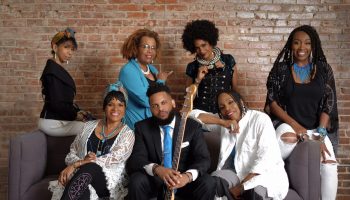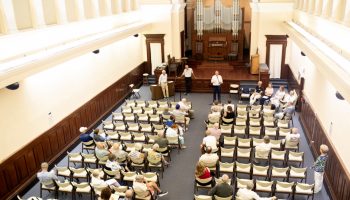
Column by Mary Lee Talbot
The Rev. Canon Stephanie Spellers spent a good portion of the last year traveling around the United States and interviewing young adults under the age 40. She had four questions that she asked the interviewees: tell me about your spiritual journey; how and where do you experience the holy; how and where do you find community; and what would you tell the church if it would shut up and listen?
“The most interesting question was the third one: How and where do you experience community?” Spellers said. It was in community where these young adults were meeting God and growing in love.
Spellers preached at the 9:15 a.m. Thursday morning worship service in the Amphitheater. Her sermon title was “Come Together, Right Now,” and the scripture readings were Ephesians 4:32–5:2 and Matthew 18:18–20.
She noted that her sermon was not going to be about the Beatles before she led the congregation in song. The words for the song were “Ubi caritas et amor, Ubi caritas, Deus ibi est. Where there is charity and love, Where there is love, God is there.”
Caroline, a 25-year-old who Spellers interviewed, grew up as an atheist and surprised her family when she decided to live in a church-sponsored intentional community. At the beginning of the year, the participants wrote down an intention they had for the year and then put it on a tree. Caroline’s intention said, “I want to know God.” As she got to know the people in the house well, she could see God in them.
Another young woman, Flor, age 21, said she felt God when she played music or joined in protests for justice. Her most visceral connection to God came when she was with people. “I don’t feel the divine when I am alone,” she said.
Spellers said, “These young people are passionate about community. I kept hearing Matthew 18 in what they said. ‘For where two or three are gathered in my name, I am there among them.’ God is in the sacred spaces between us, and we are better together.”
This sentiment goes against the grain of the American self-image, Spellers told the congregation. Going it alone, the survival of the fittest or the settlers believing they were entering a tabula rasa, a blank space, is part of the American psyche. The colony at Jamestown would not have survived without the Powhatan Confederacy providing food, tools and knowledge in exchange for peace.
“Self-sufficient. Go it alone. I don’t think so; never was, never will be,” she said. In the wake of the COVID-19 pandemic, people did organize their lives around being alone or online. Spellers said she experienced genuine anxiety as she entered her post-pandemic life. “My body had forgotten how to be with groups. Remote life is not the way humans thrive. We are better together.”
She reminded the congregation that the God of Christianity is “God in three persons,” in Greek perichoresis. “There is a never-ending dance within the Trinity of Jesus’ Abba, father and mother, Jesus who stretches out to the world and the Spirit which is on the move.”
Spellers continued, “One God, one body, mind and spirit wants us to join them. When the circle breaks, it is to draw us into the dance and participate in their life. They could choose to dance privately, but the center of the dance is community.”
We are made in the image of a relational God, she told the congregation, and some things can only happen when two or three are gathered together. The apostle Paul told the Ephesians to be kind, to be tender-hearted, to forgive as Christ forgave us and to walk in love. “That is the context of community, imitating God who is the community of love.”
Spellers cited Interim Chief Executive Kyle Keogh who calls Chautauqua a community of communities. “What have you found here? What will you save? What will you pass along? The most precious gift (for me) is each of you, newcomers and old-timers. You are better together. You need to fill the reservoir of tenderness and kindness, nurture the younger generation. We need to come together.”
She continued, “I want you to turn to your neighbor and say, ‘God is here.’ Now turn to another neighbor and say, ‘God is here.’ Now raise your hands and say, ‘God is here.’ Amen.”
The Rev. John Morgan, pastor at the Presbyterian Church in Williamsburg, Virginia, presided. The Rev. Natalie Hanson, former interim senior pastor for Chautauqua, read the scripture. Members of the Motet Consort — Barbara Hois, flute, and Joseph Musser, piano — performed “Fury of Light: Elegy,” by Jake Heggie, for the prelude. The Motet Choir sang “Beloved, Let Us Love One Another,” music by Van Denman Thompson and text from John 4. The choir was under the direction of Joshua Stafford, director of sacred music and the Jared Jacobsen Chair for the Organist, and accompanied by Owen Reyda, organ scholar, on the Massey Memorial Organ. Reyda performed “Festival,” by Healey Willan, for the postlude. Support for this week’s chaplaincy and preaching is provided by the John William Tyrrell Endowment for Religion.




